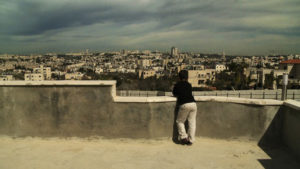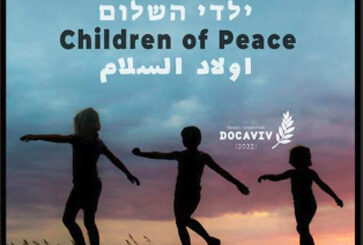P.S. Jerusalem: Danae Elon Returns Home
 As an American Jew trying to deal with the stress of Trumpland, I can only imagine the psychological ramifications of living in Israel. As that country’s drift to the right preceded America’s, so did the heated rhetoric. We saw the American version in Trump’s campaign. Ironically, Yuval Rabin pointed to the similarities in an August 2016 editorial.
As an American Jew trying to deal with the stress of Trumpland, I can only imagine the psychological ramifications of living in Israel. As that country’s drift to the right preceded America’s, so did the heated rhetoric. We saw the American version in Trump’s campaign. Ironically, Yuval Rabin pointed to the similarities in an August 2016 editorial.
Danae Elon’s new documentary, “P.S. Jerusalem,” offers a bird’s-eye view of a society at war externally and internally. It is a three-year visual diary. Danae records her move from Brooklyn, New York back to the city of her childhood, Jerusalem.
Having left the city at 21, Danae’s memories are not the only baggage she carries with her. Her personal history is informed by more than the location of her early youth.
Danae’s father was Amos Elon, noted writer on the state of Israel, and later the changes wrought by the 1967 war. As a journalist and intellectual, he repeatedly examined the ramifications of the occupation.
Amos Elon believed that the settlements created less security for Israel. He saw the changes that holding these territories yielded, and became disillusioned with what his country had become. As a result, he left Israel. He also entreated his daughter never to return.
The point of view of Amos Elon changed dramatically from 1948, the year of the Arab-Israeli War. At that time, he did not include the destruction of Palestinian homes and that population’s displacement in his reporting. By 1970, three years after the game-changing Six-Day War, a new path was being forged. Elon did not believe that what was to come was what “the founding fathers envisioned.” He said, “What was planned as a safe haven turned out to be a country engaged in perpetual war.” For him, Israel became qualified by “high tragedy and unending strife.” The 7-year old who emigrated with a family fleeing Vienna, and adopted a Hebrew name at 18, became consumed by the shattering loss of the “dreams of a just society.”
Danae serves as the narrator for her film. She describes her upbringing as political. Her mother took her to demonstrations. Her father’s ethical concerns were always at the forefront of the family’s consciousness.
As the film begins, Danae is pregnant with her third child (who will be named Amos). She moves to Jerusalem with her partner, Philip Touitou, and their sons Tristan and Andrei. Her father has just died.
Initially, Philip, a French-Algerian Jew, is dubious about the move. However, he is willing to allow for the possibility, “Maybe I will find my place here.” A photographer, he speaks no Hebrew.
As the children get settled in to their new home, one of the boys unwraps a gas mask. “Mommy, what is it?” he asks.
The viewer is introduced to the internal dissension in Jerusalem with footage of a rally. Arab residents in East Jerusalem are being displaced by Jewish tenants. The largest new housing residence is being unveiled. One hundred units — built for Jews only. One of the demonstrators holds a sign in English: “Jerusalem won’t be Hebron.”
The camera pans to a man with a toddler in a stroller. He is screaming at the assembled group.
“If you’re helping the Arab enemy, your ancestors must have helped the Nazis. Your grandfather must have been a Kapo! I’m sure of it.”
It’s a sickening display. It also brings to mind the words of David Friedman, Trump’s choice for Ambassador to Israel.
It gets more ominous as a gaggle of men start cursing at Danae for filming. They tell her to stop, then scream epithets about Arabs. “Jewish blood is not to spare. A leftist is a son of a bitch,” they inform her.
Danae reflects on her need to make a record of injustice. She also admits that in some way it also functions to “absolve her of responsibility.”
There are other scenes of Israeli transgressions. Danae takes her son with her as she captures the demolition of a Palestinian home. The wrecking machine looks like a large metallic dinosaur, its jaws crushing the concrete and mashing it into rubble.
Clearly, Danae is torn with ambivalence. She looks for answers in her constant questioning of Philip and the children.
Interacting with her sons, Danae’s persistence often borders on intrusiveness — demonstrating a lack of boundaries. In one instance, she is told, “Stop filming me!” When she presses her son to explain his statement, “I’m not a Jew. I’m an American,” he shuts her down with the plea, “Please let me go to sleep.”
Conversely, the innocence of her growing children’s questions serve to present an existential dimension to matters both parents are also struggling with.
On a visit to see a friend who lives in a Jewish settlement, Tristan asks, “What are settlements? Why do they burn the olive trees? What is a check point? What do soldiers do?” In the middle of this exchange, it’s mentioned that Palestinian workers are building the new homes for the settlers.
Danae tries to change the narrative for her kids by sending them to the Hand in Hand school. Both Arab and Jewish children attend. The philosophy focuses on teaching in Arabic and Hebrew, with dialogue about both cultures and the different religions that inhabit Jerusalem. But nothing is easy. Circumstances are often larger than well-intentioned agendas.
All holidays are acknowledged. Unlike Danae, who learned in school that “Israel was born on barren land,” her  offspring are taught about Nakba Day. It is the Palestinian Day of Remembrance, also known as the “Day of the Catastrophe.” It is explained that entire Palestinian villages were destroyed during Israel’s birth. The very young students try hard to understand exactly what happened. One boy repeats what he thinks has been said, only to be told by a classmate that he has gotten it exactly backwards.
offspring are taught about Nakba Day. It is the Palestinian Day of Remembrance, also known as the “Day of the Catastrophe.” It is explained that entire Palestinian villages were destroyed during Israel’s birth. The very young students try hard to understand exactly what happened. One boy repeats what he thinks has been said, only to be told by a classmate that he has gotten it exactly backwards.
As Tristan becomes a close companion with Luai, an Arab pupil, his inquiries become more pointed. On the Israeli Memorial Day for Soldiers, the Jewish children attend a ceremony. The Arab children have another activity. Tristan decides to stay home rather than having to “choose sides.”
The realities of the state intrude constantly on daily life. Tristan sees a wide road being built to connect settlements on the outskirts of Bethlehem and Hebron to Jerusalem. It will bisect the neighborhood of his Arab acquaintances, “splitting the community in two.”
During their second year, Danae asks, “Who are we becoming as a family?” She wrestles with primal feelings of coming back to Jerusalem, “because it was the only place that felt like home.” She wanted to share that with Philip and the children. But the strain is getting palpable and the fissures are growing deeper.
Philip relates a disconcerting story to Danae about how their youngest son was hit by an Arab boy — when he thought no one was looking. Philip, in a visceral response, in turn slaps the child. He is appalled at this own reaction. “It’s a very violent place,” he says. “It comes from the guts.”
Acknowledging the conundrum, Danae states flatly, “Just by choosing to be here, you can’t help but be a part of it.”
It’s an ongoing struggle.
“I have to admit that I’m feeling a bit lost,” Danae reveals. “I just feel that so much has changed. I feel very torn. There are lots of things here I love and care about.”
Philip has no such conflict at this point. Without friends, due to the language barrier and his politics, he wants to resume “a normal life.” He discusses the fact that he is not treated well by Israelis due to his Algerian heritage. “It’s a racist place,” he states. “We are helping a devil.”
None of what transpires is easy to watch. As the timeline moves into the third year, you wonder if Danae is going to sacrifice her family for her homeland. She verbalizes the problem with frustration: “Sometimes if feels like a vicious circle.”
Danae uses a snowfall in Brooklyn at the start of the film and a snowfall in Jerusalem toward the denouement as bookends. It paints the portrait of a quiet gentleness that gives purity to the surroundings.
Questioning the concept of home, Danae makes a point of noting that her father did not believe in “home.” Like Dorothy in her journey to Oz, she comes to understand that Philip and her children are her home.
As bereft of hope as much of the film is, there is a scene at the end that leaves the door open. With boxes packed and ready to be shipped, it is time for Tristan to say goodbye to Luai. They are in the backseat of the car that will take Tristan to the airport. He insists that he and Luai will not be parted. Both boys cling tearfully to each other and their relationship. The moment transcends all the previous vitriol and dispiriting incidents.
Danae’s story is her very personal microcosm of an untenable situation. The family now lives in Montreal.
The challenge to find a resolution continues for those who remain.
Photos: Courtesy of P.S. Jerusalem




